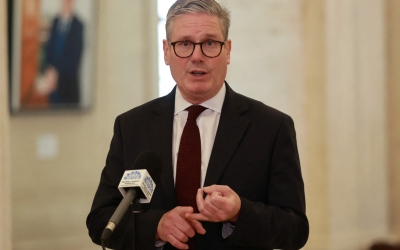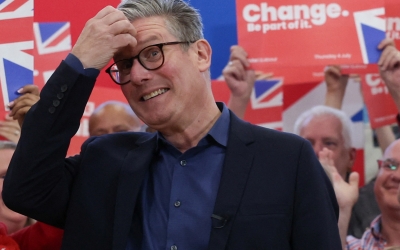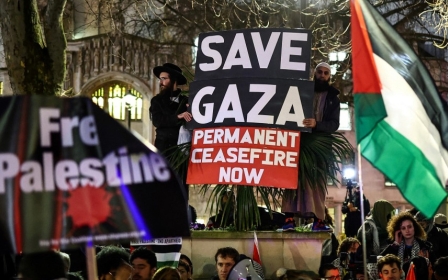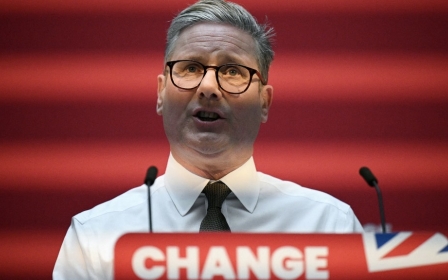UK elections 2024: Why British Muslim voters can no longer be ignored
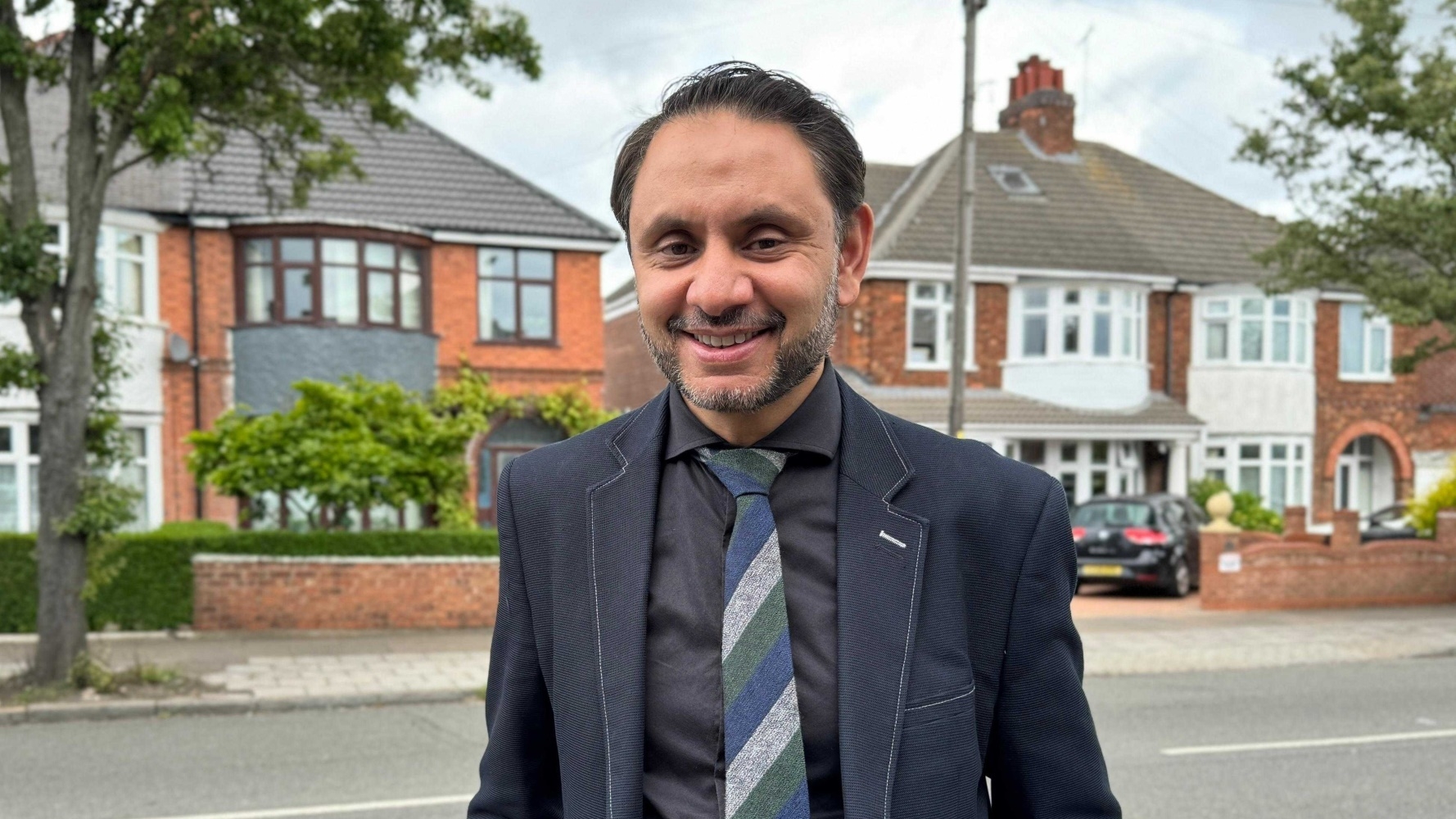
As the dust settles in the aftermath of the UK’s general election, there is much talk in British Muslim spaces about the role that bloc voting played in the election of five independent MPs on a pro-Palestine ticket.
The energy and momentum in the build-up to the election were palpable, as local campaigns mobilised to support independent candidates. Their candidacy was a bid to disrupt what is termed the duopoly of the two main political parties, and send a strong message to them regarding their complicity in the ongoing genocide in Gaza.
Muslim bloc voting initiatives are by no means a new idea. Indeed, there have been several iterations over the years seeking to harness the power of a collective voice to engage tactically with an electoral system designed to exclude dissent and maintain a political status quo.
However, whereas past attempts may have acknowledged that candidates from main parties with favourable policies could be supported, this general election saw a veritable groundswell of steadfast opposition to any candidate from either the Conservative or Labour parties.
So great was the determination of campaigners to disrupt the two-party system, that when the Muslim bloc voting coalition The Muslim Vote included a handful of Labour MPs in its list of endorsed candidates, they provoked enough indignation that endorsements were swiftly reconsidered and withdrawn.
New MEE newsletter: Jerusalem Dispatch
Sign up to get the latest insights and analysis on Israel-Palestine, alongside Turkey Unpacked and other MEE newsletters
But amid the post-election analysis, a big question British Muslims should contend with is: what next?
There are two themes that are worth thinking about at this moment.
Deeper questions
The first relates to mainstream discourse and its expectations of Muslim political agency. Commentators in the media and political establishment have attempted to portray independent campaigns more generally, and Muslim voters in particular, as sectarian and separatist or as boorish and barbaric.
It is suggested that bloc voting is not only unruly and unbecoming but that, more seriously, it is a symptom of questionable loyalties and a threat to "our democracy". This is a discourse that resonates with media and political commentary around other examples of organised Muslim civic and political agency - the Trojan Horse affair being one which immediately springs to mind.
Follow Middle East Eye's live coverage of the Israel-Palestine war
But rather than balking at impromptu collectives cobbled together on shoestring budgets in response to a snap election, the commentariat should ask itself a deeper question.
What is the value in a democracy whose self-proclaimed vanguard begins to panic at the sight of an "uppity" Muslim electorate proactively organising to engage in issues they are passionate about and to maximise their voting power in a system designed to disempower them and other minority voices?
A larger issue is at stake here: who gets to decide the parameters of civility in our political arena?
In between general elections, the minoritised and marginalised live with a perpetual sense of disenfranchisement and frustration at policies that hurt them first and foremost.
Can the establishment therefore be so surprised when communities that have been persistently failed and their struggles ignored use their political literacy to create a space where they can be heard in the system?
The truth is of course that acceptable parameters for Muslim public behaviour are already being delimited in various ways by the state.
We are told which civil society organisations are pariahs, which forms of protest are and are not acceptable, and which religious terminologies and cultural references are extremist and which are not.
Critiques of Muslim electoral agency are therefore entirely consistent with the policing of public expression that they experience more generally, and speaks to a political elite that is insecure about maintaining its continued pre-eminence and privilege.
Monumental task
The second theme worth considering is how communities and collectives advocating for justice and against structural inequalities conceive of politics and political agency.
As to the newly elected and (in Jeremy Corbyn’s case) returning independent MPs, they certainly stand to deliver refreshing, critical voices in a parliamentary chamber where party lines weigh heavily on debate and decision-making.
Communities who worked incredibly hard campaigning for them will be gratified and elated to see the role that voter awareness and mobilisation played in toppling a handful of Labour MPs, and the slashed majorities we have seen are of course dramatic and notable achievements demonstrating the potential for future similar grassroots local campaigns.
A few outspoken independent MPs will certainly constitute a political thorn in Westminster's side - a satisfying and encouraging sight for many disenchanted voters
There is talk of the humbling of Labour MPs who squeezed through on slivers of majorities, and perhaps this may have been momentarily felt.
But in the long run, we have a House of Commons with an overwhelming majority for Labour, and when MPs sit in the chamber passing legislation, large or small electoral majorities will be of no significance.
So even though, for many almost successful independent candidates, building on their results by standing again in future elections seems like an obvious next step, a measure of caution against relying on effecting change through the electoral system is in order.
A few outspoken independent MPs will certainly constitute a political thorn in Westminster's side - a satisfying and encouraging sight for many disenchanted voters.
But with a winner-takes-all voting system, where only 33 percent of votes deliver a staggering 63 percent of seats to one party, the task of delivering substantive structural change through the ballot box alone is monumental and not realistically achievable with the urgency that communities need.
No permission needed
For all the political literacy and collective organising that this election has seen, Muslim activists would be remiss if they were to limit their organising to building on electoral gains every five years, just as they would be remiss if they were to allow parameters of "civility" to be dictated to them by the liberal commentariat and government ministers.
A valuable takeaway would be for British Muslims to fully realise that our communities do not need permission from the establishment to participate in politics.
Muslims do not need to be told when and how they can be vocal in the public space, nor should they have to apologise for wanting to engage intelligently with an electoral system that is skewed in favour of the status quo and by default disadvantages minorities' voices and causes.
Political compliance and quietism are not, as some might have us believe, prerequisites of "successful integration". After all, communities are people first and foremost, before, above and beyond being an "electorate".
Over the past few months, we have seen students defying and disrupting implied and imposed parameters of civility and propriety on their campuses as they demand university administrators declare and divest from their interests in Israel, and shout to whoever will hear that they cannot continue with their studies and relegate an ongoing genocide into some sort of background event.
If this election has shown us anything, it is that the local and grassroots movements which gained momentum over the past month do not need to wait for a sanitised window when the establishment allows them to be political, only to retreat again and endure disenfranchisement for the next five years.
Rather, they can and should also find creative ways in the everyday to collaborate with like-minded others, interrogate and hold those in power to account, and consistently raise awareness and campaign for their causes.
The views expressed in this article belong to the author and do not necessarily reflect the editorial policy of Middle East Eye.
Middle East Eye delivers independent and unrivalled coverage and analysis of the Middle East, North Africa and beyond. To learn more about republishing this content and the associated fees, please fill out this form. More about MEE can be found here.



